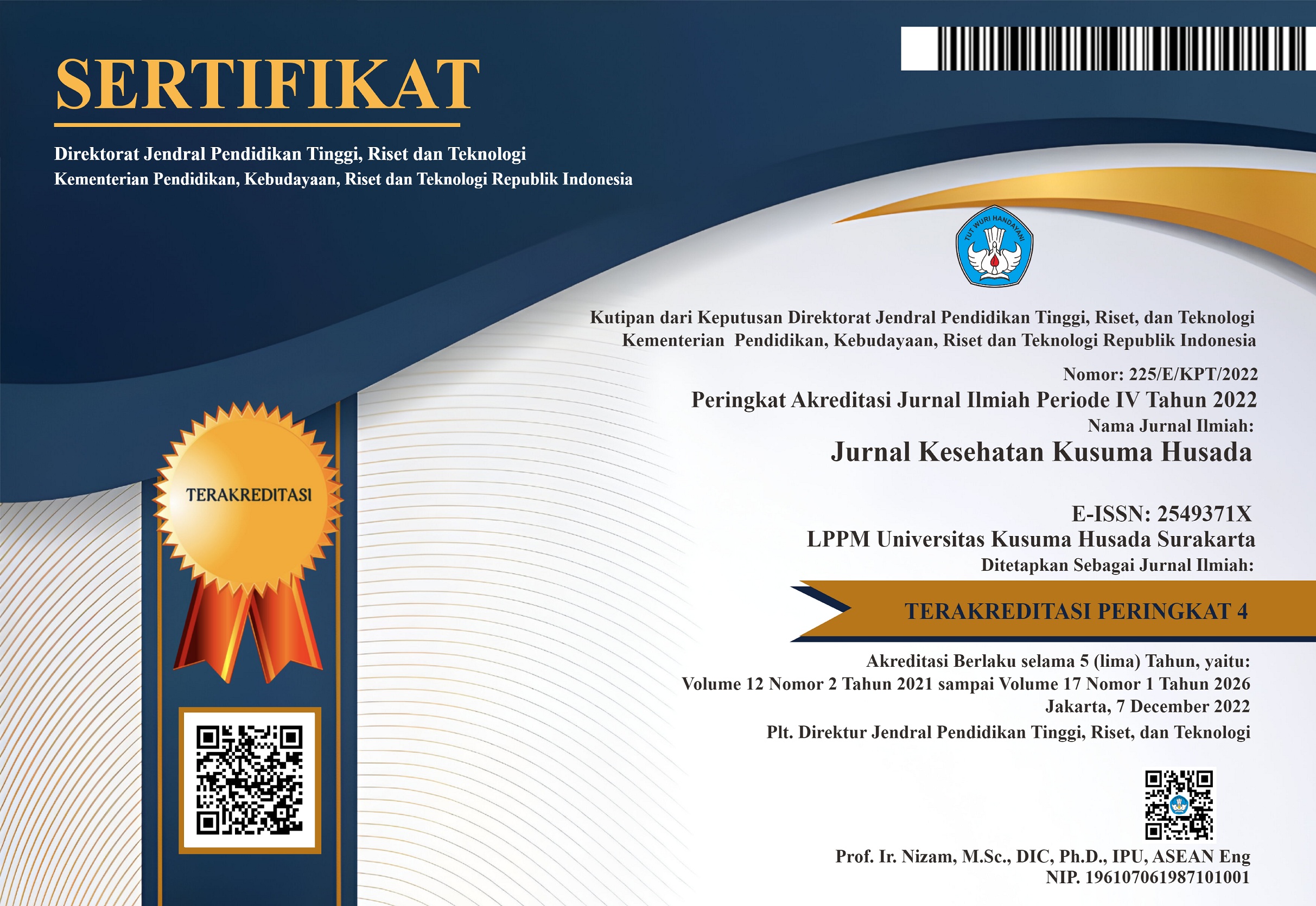PENGARUH KONSELING MENGGUNAKAN ALAT BANTU PENGAMBILAN KEPUTUSAN (ABPK) BER-KB TERHADAP PENGGUNAAN KONTRASEPSI INTRA UTERIN DEVICE (IUD) (STUDI PRE EKSPERIMEN DI DESA PLATAREJO KECAMATAN GIRIWOYO KABUPATEN WONOGIRI TAHUN 2013)
Abstract
ABSTRAK
Indonesia merupakan negara dengan jumlah penduduk yang berada pada posisi keempat di dunia, dengan laju pertumbuhan yang masih relatif tinggi. Intra Uterine Device (IUD) merupakan alat kontrasepsi dalam Rahim yang terbilang efektif karena angka kegagalannya 1 dari 127-170 kehamilan. Untuk meningkatkan akseptor IUD, perlu adanya informasi dan konseling yang memadai. Alat Bantu Pengambilan Keputusan (ABPK) ber-KB merupakan alat bantu konseling yang berisi informasi mutakhir seputar kontrasepsi/KB dan standar proses dan langkah konseling KB yang berlandaskan pada hak klien. Tujuan penelitian untuk mengetahui karateristik responden, mendiskripsikan distribusi kontrasepsi sebelum konseling, mengidentifikasi jenis alat kontrasepsi yang dipilih responden setelah konseling, mengetahui pengaruh ABPK ber-KB terhadap penggunaan kontrasepsi IUD di Desa Platarejo. Metode penelitian yang digunakan yaitu pre-eksperimen studi Intact Group Comparison. Teknik pengambilan sampel yang digunakan adalah purposive sampling. Keseluruhan sampel berjumlah 30 responden. Teknik analisa data dengan uji Chi-Square, dengan taraf signifikasi 0,05. Hasil penelitian menunjukkan sebagian besar umur responden adalah 20 – 35 tahun (66,7%), dengan paritas 1-2 (93,3%), mayoritas responden bekerja sebagai ibu rumah tangga (46,6%). Sebelum diberikan konseling, kontrasepsi yang digunakan responden terbanyak adalah KB suntik (50%), IUD merupakan kontrasepsi yang paling sedikit digunakan (0%). Pada responden yang diberikan konseling dengan ABPK sebanyak (36,8%) beralih ke IUD, (6,6%) masih menggunakan KB suntik dan (6,6%) menggunakan pil KB. Sedangkan pada responden yang diberikan konseling tanpa ABPK sebanyak (23,4%) tetap menggunakan KB suntik, (13,3%) menggunakan pil, (3,3%) beralih menggunakan KB Implan dan (10%) beralih ke IUD. Hasil uji analisis nonparametrik dengan UjiChi-Square diperoleh nilai X2= 8.571 dengan nilai kemaknaan (P) sebesar 0,003<0,05, maka terdapat pengaruh ABPK terhadap penggunan kontrasepsi IUD di desa Platarejo. Kesimpulan terdapat pengaruh penggunaan ABPK-berKB dalam melakukan konseling terhadap penggunaan kontrasepsi IUD di Desa Platerjo.
Kata kunci: ABPK, KB, IUD, konseling.
ABSTRACT
Indonesia is a country with a population that is at the fourth position in the world, with a growth rate which is still relatively high. Intra Uterine Device (IUD) is a contraceptive in the uterus is considered effective because the number 1 of 127-170 pregnancy failure. To improve IUD acceptors, the need for adequate information and counseling. Decision Aid (ABPK) family planning counseling is a tool that contains the latest information about contraception / birth control and process standards and step family planning counseling based on the client’s rights. The purpose of research to determine the characteristics of the respondents, describing the distribution of contraceptives before counseling, identifying the type of contraception chosen respondents after counseling, ABPK determine the effect of family planning on the use of IUD in the village Platarejo. The method used is a pre-experimental study of Intact Group Comparison. The sampling technique used was purposive sampling. Overall the sample amounted to 30 respondents. Data analysis techniques with Chi-Square test, with a significance level of 0.05. The results showed that most of the respondents were aged 20-35 years (66.7%), with parity 1-2 (93.3%), the majority of respondents worked as housewives (46.6%). Before being given counseling, contraceptive use is most respondents injections (50%), the IUD is a contraceptive that is least used (0%). On respondents who were counseled by ABPK as much (36.8%) switched to an IUD, (6.6%) still use injections and (6.6%) using birth control pills. While the respondents were given counseling without ABPK as many (23.4%) continue to use injections, (13.3%) using the pill, (3.3%) switched to using birth control implants and (10%) switched to the IUD. Nonparametric analysis of test results with UjiChi-Square values obtained X2 = 8,571 with significance value (P) of 0.003 <0.05, then there is the effect of the use of IUD ABPK in Platarejo village. There are significant conclusions ABPK-berKB use in counseling against the use of IUD in the village Platerjo
Keywords: ABPK, KB, IUD, counseling
The copyright of the published articles belongs to Jurnal Kesehatan Kusuma Husada.

This work is licensed under a Creative Commons Attribution 4.0 International License.













